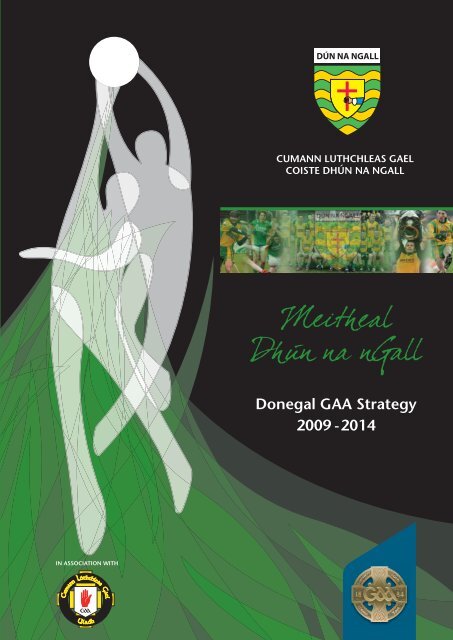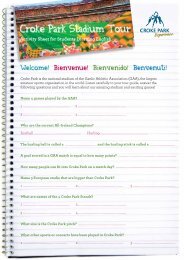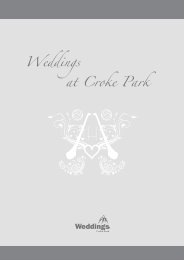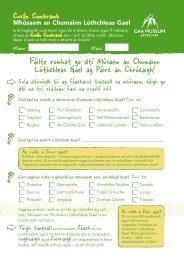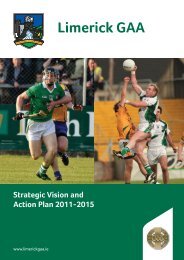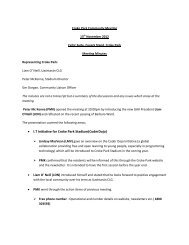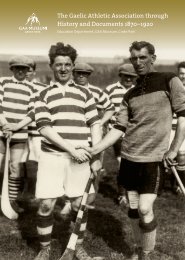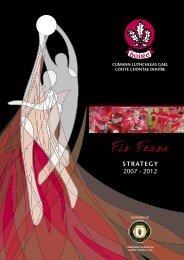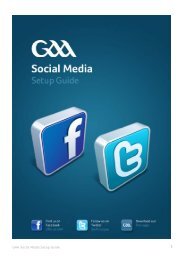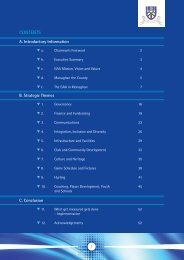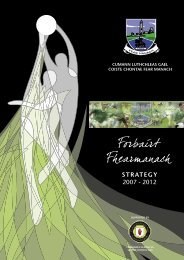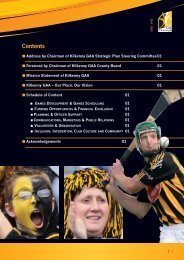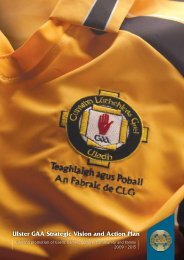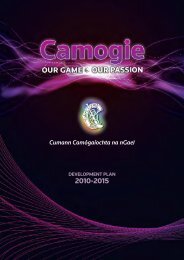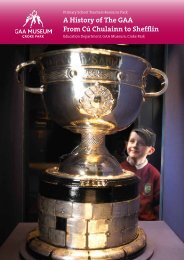Donegal County Board Strategic Plan, 2009-2014 (pdf) - Croke Park
Donegal County Board Strategic Plan, 2009-2014 (pdf) - Croke Park
Donegal County Board Strategic Plan, 2009-2014 (pdf) - Croke Park
Create successful ePaper yourself
Turn your PDF publications into a flip-book with our unique Google optimized e-Paper software.
CUMANN LUTHCHLEAS GAEL<br />
COISTE DHÚN NA NGALL<br />
<strong>Donegal</strong> GAA Strategy<br />
<strong>2009</strong> - <strong>2014</strong><br />
IN ASSOCIATION WITH
Réamhrá<br />
It is essential that any organisation takes time to reflect and review all its activities from time to time. We in<br />
<strong>Donegal</strong> have availed of the tremendous opportunity afforded to us by the Ulster Council to plan, context and<br />
outline a strategic prospective for the future of the GAA in <strong>Donegal</strong>.<br />
This <strong>Plan</strong> is in my view the most important document to face <strong>Donegal</strong> in a long time. No part of our<br />
organisation will be left to chance, be it governance, games, fixtures, coaching, infrastructure, inclusion,<br />
community, Clubs, volunteers, youth, marketing, cultural, communication or funding.<br />
The critical review we carried out over a period of months resulted in a <strong>Plan</strong> that is a reflection of the views and<br />
ambitions of individual members, Clubs and various sub-committees. This <strong>Strategic</strong> <strong>Plan</strong> for <strong>Donegal</strong> is “ours”<br />
and is underpinned by the clear values and views of all to want to make the GAA in <strong>Donegal</strong> better. It will<br />
provide huge challenges to us all to implement and carry out the contents of this <strong>Plan</strong>. But every challenge also<br />
presents an opportunity to improve our lot – to stand still is not an option.<br />
Our youth are one of the core targets we have addressed: our aim is to deliver an organisation that will benefit<br />
all our children and make Gaelic games and pastimes more accessible and welcoming for all. How well we do in<br />
terms of nurturing and catering for the next generation now and into the future so that they help to build their<br />
community through their local GAA Club, will go a long way to securing the well-being of the GAA in <strong>Donegal</strong>.<br />
Such a comprehensive document did not happen by chance, time or even effort was required from many<br />
people. I thank all who made contributions. A special thanks to the planning sub-committee chaired by Brian<br />
McEniff Central Council Delegate who was greatly assisted by Noreen Doherty, Secretary of the <strong>Strategic</strong><br />
<strong>Plan</strong>ning Group. To the Ulster Council, and in particular Ryan Feeney and Mark Conway, a very sincere buíochas.<br />
It is essential that we adopt this Strategy as the best way forward for the green and gold of <strong>Donegal</strong>.<br />
The starting point is now.<br />
Seán Ó Ceallaigh<br />
Cathaoirleach, Bord na Contae C.L.G. Dhún na nGall<br />
2
Contents<br />
Réamhrá An Chathaoirligh 2<br />
Executive Summary 4<br />
<strong>Donegal</strong>: The GAA <strong>County</strong> 8<br />
Taking the GAA in <strong>Donegal</strong> Forward 12<br />
• Managing the GAA in <strong>Donegal</strong> 12<br />
• Running the Games 15<br />
• Coaching and Games Development 17<br />
• Club and Community Development 19<br />
• Hurling and Camogie 21<br />
• Infrastructure 23<br />
• Irish Culture and Heritage 26<br />
• Urban <strong>Donegal</strong> 28<br />
• An Inclusive GAA 29<br />
• Health, Wellness and Lifestyle 32<br />
• Marketing, Communications and PR 34<br />
• Funding <strong>Donegal</strong> 36<br />
What Gets Measured Gets Done 38<br />
Acknowledgements 39<br />
3
Executive Summary<br />
Meitheal Dhún na nGall sets out a strategic<br />
framework for the development of the GAA in<br />
<strong>Donegal</strong> over the next five years. It is the seventh<br />
in a series of <strong>County</strong> GAA strategic plans facilitated<br />
by Comhairle Uladh. The <strong>Plan</strong> was developed on<br />
the back of widespread consultation with, and<br />
significant inputs from, the wider <strong>Donegal</strong><br />
GAA family.<br />
<strong>Donegal</strong> is an expansive <strong>County</strong> of almost 150,000<br />
people. It is a <strong>County</strong> both of huge variety and<br />
substantial geographic fragmentation. <strong>Donegal</strong> also<br />
has one of Ireland’s richest cultural heritages and<br />
is one of the few places where Irish survives as a<br />
living language, used on a daily basis. The <strong>County</strong> is<br />
now growing in population terms after decades of<br />
decline but issues of remoteness and peripherality<br />
still affect it.<br />
The GAA has long been a substantive presence in<br />
the <strong>County</strong> but in the past half-century in particular<br />
it has been brought to the highest levels, both<br />
in terms of participation and achievement. The<br />
analysis which underpinned Meitheal Dhún na nGall<br />
identified twelve Themes which people felt needed<br />
to be addressed if the GAA was to be taken forward<br />
to best effect. Those Themes run right across the<br />
full spectrum of GAA activity and are:<br />
• Managing the GAA in <strong>Donegal</strong><br />
• Running the Games<br />
• Coaching and Games Development<br />
• Club and Community Development<br />
• Hurling and Camogie<br />
• Infrastructure<br />
• Irish Culture and Heritage<br />
• Urban <strong>Donegal</strong><br />
• An Inclusive GAA<br />
• Health, Wellness and Lifestyle<br />
• Marketing, Communications and PR<br />
• Funding <strong>Donegal</strong><br />
The <strong>Plan</strong> goes on to list a series of actions against<br />
each Theme. Responsibilities for the actions are<br />
allocated and a sense of when they should be<br />
carried out is given. Finally, because the whole<br />
thrust of the <strong>Plan</strong> is on outcomes or on what the<br />
GAA in the <strong>County</strong> wants to achieve, an outcome<br />
for each action is specified.<br />
<strong>Donegal</strong> Profile<br />
<strong>Donegal</strong>: What and Where<br />
<strong>Donegal</strong> is a sizeable <strong>County</strong> (4,830 sq km in area)<br />
covering the extreme north-west corner of Ireland.<br />
It brings together coasts, mountains and inland<br />
areas of great beauty, ruggedness and variety.<br />
Maritime influences are strong across much of<br />
<strong>Donegal</strong>: it actually contains about 17% of the<br />
national coastline and has a number of offshore<br />
islands, two of which, Arranmore and Tory, remain<br />
significantly populated. The Derryveagh Mountains<br />
in the north and the Bluestacks in the south<br />
comprise its main upland areas: the traditional<br />
Lagan area centred on the east of the <strong>County</strong><br />
meanwhile provides sharply-contrasting, good<br />
quality lowlands.<br />
<strong>Donegal</strong>’s size (only Cork, Galway and Mayo are<br />
larger Counties) and geography have contributed<br />
to its clear sense of difference. It borders just one<br />
other <strong>County</strong> in the Republic and internally, physical<br />
communication has always been difficult, even<br />
along what might be expected to be basic northsouth<br />
and east-west axes.<br />
One consequence is probably a heightened sense of<br />
the local and a strong appreciation of place. These<br />
are of course core GAA dynamics.<br />
<strong>Donegal</strong>: Creating the<br />
Modern Context<br />
The <strong>County</strong>, mostly then the kingdom of Tír<br />
Chonaill, was a bastion of Gaelic Ireland until the<br />
Flight of the Earls in 1607. The Grianán of Aileach<br />
in its north-east corner, for example, was a hugely<br />
significant political and cultural centre during the<br />
two millennia that spanned the birth of Christ.<br />
Rory O’Donnell’s departure from <strong>Donegal</strong> in<br />
1607 formally ended the ruling sovereignty of the<br />
O’Donnell clan and ushered in the influences of the<br />
<strong>Plan</strong>tation of Ulster which would do much to shape<br />
modern <strong>Donegal</strong>.<br />
4
The Great Famine of the mid-19th Century came<br />
on the back of a number of earlier lesser famines<br />
and a fall in fish stocks off the coast. Its impact on<br />
<strong>Donegal</strong> was shattering, the <strong>County</strong>’s population<br />
tumbling by 26% (from over 296,000 to 218,000)<br />
in the three decades between 1831 and 1871. Those<br />
joint traditions of emigration and population<br />
decline would persist for the next century and by<br />
1971 <strong>Donegal</strong>’s population had bottomed out at<br />
108,000 … just over a third of its pre-Famine peak.<br />
During that time <strong>Donegal</strong> developed strong<br />
economic and cultural links with Scotland and with<br />
Glasgow in particular. Paradoxically, at the same<br />
time partition in Ireland reduced <strong>Donegal</strong>’s social<br />
and economic contact with its neighbouring Derry<br />
City, Tyrone and Fermanagh. One impact was<br />
to accentuate <strong>Donegal</strong>’s sense of difference. The<br />
opportunities offered by peace include options in<br />
terms of innovative cross-border working<br />
and partnerships.<br />
Modern <strong>Donegal</strong><br />
<strong>Donegal</strong> today retains many significant links with<br />
its history and origins. Irish culture and heritage<br />
are particularly strong … and not just as add-ons<br />
but as meaningful parts of everyday life. The GAA<br />
is of course part of this but <strong>Donegal</strong> also includes<br />
a large Gaeltacht area where some 23,000 people<br />
speak fluent Irish. The <strong>County</strong> also has a strong<br />
literary tradition and Irish music, song, dance and<br />
art all continue to flourish. Finally, <strong>Donegal</strong>’s island<br />
population of almost 700 sets it apart from most<br />
other Irish Counties.<br />
Modern <strong>Donegal</strong> is also a growing place,<br />
somewhere where people now come to … rather<br />
than leave to go elsewhere. Between 1971 and<br />
2006 its population grew by a very sizeable 36%, to<br />
over 147,000. In the four years 2002-06 alone, over<br />
6,500 people moved into the <strong>County</strong> from outside.<br />
<strong>Donegal</strong>’s population is also one of growing variety.<br />
Some 18,000 “non-Irish born” people now live<br />
here. About 13,000 of these were born in Britain<br />
and the remainder are split fairly evenly across<br />
Poland/Lithuania, the rest of the EU, the USA and<br />
the rest of the world.<br />
The <strong>County</strong>’s age structure is young with 30%<br />
aged 19 or under and 17% aged 60 or over.<br />
Some 75,000 people (essentially half <strong>Donegal</strong>’s<br />
population) fall into the “5-to-39” age group,<br />
traditionally the target market for active<br />
participation in Gaelic Games. Providing activities<br />
which cater for their needs and aspirations – as well<br />
of course for the needs and aspirations of the less<br />
physically active sectors of the population – is a<br />
central challenge for the GAA.<br />
5
Unlike most of modern Ireland, <strong>Donegal</strong> remains a largely rural <strong>County</strong>. Only one-person-in-four lives in a<br />
settlement of 1,500 people or more whereas nationally six-people-in-every-ten fall into that category. Issues of<br />
isolation, remoteness and communication difficulties therefore remain central to life in the <strong>County</strong>. <strong>Donegal</strong><br />
<strong>County</strong> Council for example has put in place a radical and pioneering decentralisation initiative to combat<br />
precisely these issues of distance within the <strong>County</strong>.<br />
Several parts of the <strong>County</strong> accommodate substantial holiday and second home populations. These are<br />
typically “in” but not “of” <strong>Donegal</strong> and can bring in their wake significant integration and community<br />
development concerns.<br />
<strong>Donegal</strong>’s population is distributed across the <strong>County</strong> as follows:<br />
DONEGAL’S POPULATION DISTRIBUTION<br />
4% 1%<br />
3%<br />
2%<br />
2%<br />
12%<br />
1%<br />
Ballybofey/Stranorlar<br />
Ballyshannon<br />
Buncrana<br />
Bundoran<br />
75%<br />
<strong>Donegal</strong><br />
Letterkenny<br />
Lifford<br />
Rural<br />
Improved economic times have underpinned <strong>Donegal</strong>’s recent population growth. However relative to the rest<br />
of Ireland the <strong>County</strong> still has work to do, the most recent figures showing disposable incomes in <strong>Donegal</strong> to be<br />
some 16% below the national average. Local labour force participation rates are, at 57.2 some five percentage<br />
points below the national average of 62.5. Put simply, <strong>Donegal</strong> has not enjoyed the full economic prosperity<br />
that has recently flowed across much of Ireland.<br />
The <strong>County</strong>’s economic activity can be summarised as follows:<br />
6
PEOPLE AT WORK<br />
IN DONEGAL<br />
Farming, Forestry,<br />
Quarrying and Fishing<br />
Other<br />
17%<br />
7%<br />
11%<br />
Manufacturing<br />
14%<br />
Construction<br />
Health and<br />
Social Care<br />
16%<br />
Education<br />
8%<br />
6% 7% 14%<br />
Retailing<br />
Public Admin<br />
Hotels and<br />
Restaurants<br />
The education sector is always important for the GAA, and across <strong>Donegal</strong> there are 176 primary and 27<br />
secondary schools. These attract some 17,500 and 11,800 pupils respectively. The <strong>County</strong> also enjoys<br />
a significant third level presence via Letterkenny IT. The college provides a range of degree and other<br />
programmes for some 2,000 full and part-time students.<br />
The Future of <strong>Donegal</strong><br />
<strong>Donegal</strong> is not a place, or series of places, that will stand still. The National Spatial Strategy applies the<br />
classifications Strong; Remote; and Culturally Significant to large tracts of the <strong>County</strong> and proposes a number of<br />
Revitalising and Strengthening strategies in response. Letterkenny/Derry is seen as a “linked Gateway” and as such<br />
is designated as an urban area of national significance. In the same way the <strong>County</strong> sits astride a growing western<br />
transport corridor linking Derry/Letterkenny/Sligo/Galway/Limerick/Cork. Cross-border developments allied<br />
with small business growth and sustainable use of natural resources are seen to underpin the <strong>County</strong>’s future.<br />
<strong>Donegal</strong> in Summary<br />
<strong>Donegal</strong> is a <strong>County</strong> where:<br />
• History has had a tangible and visible impact<br />
• Geography and distance are significant influences on social and economic life<br />
• Growth is now the natural order after a century-and-a-half of decline<br />
• Culture and heritage are strongly embedded in daily community life<br />
• The levels of prosperity enjoyed in other parts of Ireland have yet to be experienced by many<br />
• Social, community and lifestyle patterns continue to evolve and change<br />
7
<strong>Donegal</strong>: The GAA <strong>County</strong><br />
A formal, structured GAA in <strong>Donegal</strong> is just over a<br />
century old, the first GAA <strong>County</strong> <strong>Board</strong> here having<br />
been established in 1905. Within a year the <strong>County</strong><br />
had won its first Ulster Senior Championship title<br />
– in hurling. Despite that initial impetus, <strong>Donegal</strong><br />
would wait many decades before the big GAA prizes<br />
would start to roll in. For the first half of the 20th<br />
Century the growth of the GAA locally mirrored that<br />
across most of the rest of Ulster, in that it was slow,<br />
unnoticed, often painful and frequently against-theodds<br />
… yet all the time gradual and unmistakable.<br />
Although the 1930s were a decade of on-the-field<br />
achievement for <strong>Donegal</strong>, a momentum of success<br />
really only began after the Second World War (again<br />
something shared with a number of other Ulster<br />
Counties). By the 1960s the <strong>County</strong> had created an<br />
impetus that has been more-or-less maintained ever<br />
since. Three McKenna Cups, two Lagan Cups, three<br />
Ulster U21 Football titles, two Ulster Vocational<br />
Schools titles and a first two Ulster Senior Final<br />
appearances during that decade alone led inexorably<br />
to an historic Ulster SFC breakthrough in 1972.<br />
In the following third of a century <strong>Donegal</strong> has<br />
gone on to win All-Ireland Football titles at Senior,<br />
U21 and Vocational Schools levels as well as in Scór.<br />
It has simultaneously developed its GAA<br />
infrastructure, both organisational and physical, and<br />
is now firmly established as one of Ireland’s leading<br />
GAA Counties.<br />
There are currently 40 affiliated GAA Clubs in<br />
<strong>Donegal</strong>, including six dual (providing both hurling<br />
and football) and one exclusively hurling Club.<br />
The football-focussed Clubs are graded between<br />
Senior (18), Intermediate (10) and Junior (11). All<br />
seven hurling Clubs compete in the Senior grade.<br />
Club League football for adults is played across<br />
four Divisions with two further Divisions providing<br />
for Club’s Second and Third teams. Underage<br />
affairs are organised by Northern and Southern<br />
Regional Committees with an Inishowen Divisional<br />
<strong>Board</strong> operating under the remit of the Northern<br />
Committee: this reflects the historic strong influence<br />
of geography on the <strong>County</strong> and its activities.<br />
The <strong>County</strong>’s overall GAA business is overseen by a<br />
<strong>County</strong> Committee comprising 14 Officers elected<br />
at the annual <strong>County</strong> Convention, one delegate<br />
from each of the two Regional Committees and one<br />
delegate from each of the <strong>County</strong>’s affiliated GAA<br />
Clubs. The following 18 Sub-Committees deliver the<br />
detail of the <strong>County</strong> Committee’s work:<br />
• Management<br />
• Competitions Control<br />
• Hearings<br />
• <strong>Plan</strong>ning and Physical Development<br />
• Coaching and Games Development<br />
• Cultural<br />
• Public Relations/Marketing<br />
• Youth<br />
• Referees Administration<br />
• Finance<br />
• Information Technology<br />
• Grounds Management and Development<br />
• <strong>County</strong> Player Panels Finance<br />
• Referees Appointment<br />
• Fundraising<br />
• Integration<br />
• Health and Safety and Events<br />
• Financial Management and <strong>Plan</strong>ning<br />
8
DONEGAL GAA CLUB<br />
BOUNDARIES<br />
01<br />
02<br />
03 05<br />
21<br />
20<br />
19<br />
18<br />
16<br />
13<br />
14<br />
15<br />
08<br />
06<br />
07<br />
22<br />
17<br />
10<br />
09<br />
23<br />
24<br />
26<br />
12<br />
11<br />
30<br />
25<br />
31 32 33<br />
39<br />
34 35<br />
38<br />
36 37<br />
01. Iorras / Urris<br />
02. Málainn / Malin<br />
03. Carn Domhnach / Carndonagh<br />
05. Bun an Phoball / Moville<br />
06. Bun Cranncha / Buncrana<br />
07. Naomh Pádaig U. Caoin / St Patrick’s Muff<br />
08. Beart / Burt<br />
09. Naomh Colmcille / Naomh Colmcille<br />
10. Gaeil Leitir Ceanainn / Letterkenny Gaels<br />
10. Naomh Adhamhnán / St Eunans<br />
11. Naomh Pádraig Leifear / St Patrick’s Lifford<br />
12. Naomh Mhuire Conmhaigh / Convoy<br />
13. Na Dúnalbh / Downings<br />
14. Gaeil Fhánada / Fanad Gaels<br />
15. Baile na nGallóglach / Milford<br />
16. An Tearmann / Termon<br />
27<br />
28 29<br />
17. Gleann tSúilí / Glenswilly<br />
18. Naomh Mícheál / St Michaels<br />
19. Cloich Cheannfhaola / Cloughaneely<br />
20. Gaoth Dobhair / Gweedore<br />
21. Naomh Mhuire / Naomh Mhuire<br />
22. An Clochán Liath / Dungloe<br />
23. Na Rossa / Na Rossa<br />
24. Naomh Conall / Glenties<br />
25. Ard An Rátha / Ardara<br />
26. Gleann Fhinne / Glenfin<br />
27. Sean Mac Cumhaill / Sean McCools<br />
28. Aodh Rua Cuill. na gCuirdin / Red Hughs<br />
28. Setanta / Setanta<br />
29. Roibeard Eimead / Robert Emmetts<br />
30. Naomh Columba / Glencolmcillle<br />
31. Cill Chartha / Kilcar<br />
32. Na Cealla Beaga / Killybegs<br />
33. Naomh Ultan / Naomh Ultan<br />
34. Naomh Náille / St Nauls<br />
35. Na Ceithre Máistrí / Four Masters<br />
36. Naomh Bríd / Ballintra<br />
37. Paite Gabha / Pettigo<br />
38. Aodh Ruadh B.A.S. / Ballyshannon<br />
39. Bun Dobhráin / Bundoran<br />
9
The GAA in <strong>Donegal</strong>: A Timeline<br />
Year<br />
What Happened<br />
1905 First <strong>County</strong> <strong>Board</strong> established<br />
1906 <strong>Donegal</strong> (represented by Burt) win the first of three Ulster SHC titles<br />
1919 Cross-<strong>County</strong> revival of GAA activity begins<br />
1927 <strong>Donegal</strong> reach first McKenna Cup Final<br />
1930 First Ulster JFC won by <strong>Donegal</strong><br />
1932 Third Ulster SHC title comes to <strong>Donegal</strong><br />
1936 <strong>Donegal</strong> win a first Lagan Cup and retain it a year later<br />
1940 Sean Ó Cinneide becomes Uachtarán Comhairle Uladh, the first <strong>Donegal</strong> holder of the post<br />
1956 First Ulster Minor Football title comes to <strong>Donegal</strong> and St Eunan’s, Letterkenny reach a first<br />
MacRory Cup Final<br />
1963 <strong>Donegal</strong> win a first McKenna Cup, reach a first Ulster SFC Final and win the initial<br />
Ulster U21 Football Championship<br />
1964 Harry Carey is elected Uachtarán Comhairle Uladh the second <strong>Donegal</strong> holder of the post<br />
1966 A third Ulster U21 title in three years is won, the Lagan Cup is retained and a second Ulster<br />
SFC Final is reached<br />
1972 <strong>Donegal</strong> win first Ulster SFC title: Brian McEniff becomes <strong>Donegal</strong>’s first All-Star<br />
1973 Annie Boyle, Gweedore, wins <strong>Donegal</strong>’s first Scór na nÓg title (Aithriseóireacht)<br />
1975 St Joseph’s win the Ulster Club SFC title<br />
1980 Robert Emmets win <strong>Donegal</strong>’s first All-Ireland Scór na nÓg title (Ceol Uirlise)<br />
1981 Nollag Ó Gallchoir wins <strong>Donegal</strong>’s first All-Ireland Scór title (Aithriseóireacht)<br />
1982 <strong>Donegal</strong> claim a fourth Ulster U21 FC and go on to lift a first All-Ireland U21 football title<br />
1983 Cumann na mBunscol is established in <strong>Donegal</strong><br />
1984 First All-Ireland Vocational Schools title is won by the <strong>County</strong> and retained a year later:<br />
Killybegs win the Ulster Club MFC and also retain it a year later<br />
1987 Second All-Ireland U21 football title is secured<br />
1992 <strong>Donegal</strong> capture first All-Ireland SFC as well as seven All-Star awards: first Ladies <strong>County</strong><br />
<strong>Board</strong> is put in place<br />
1993 The <strong>County</strong> reaches its fifth Ulster SFC Final in a row: Martin McHugh captains Ulster<br />
to Railway Cup success<br />
2007 Tom Daly is elected Uachtarán Comhairle Uladh, the third <strong>Donegal</strong> holder of the post.<br />
2007 <strong>Donegal</strong> win first NFL title<br />
10
<strong>Donegal</strong>: The GAA Roll of Achievement<br />
Ulster Titles<br />
All-Ireland Titles<br />
Senior Football<br />
Lagan Cup/NFL<br />
Under 21 Football<br />
Minor Football<br />
All-Ireland Masters Football<br />
Junior Football<br />
Vocational Schools Football<br />
St Eunan’s College<br />
First All-Ireland B Title<br />
De la Salle Ballyshannon<br />
All-Ireland B Title<br />
McKenna Cup<br />
Senior Hurling<br />
Junior Hurling<br />
Scór Sinsear (Aithriseoireacht)<br />
Tráth na gCeist<br />
Amhránaíocht Aonair<br />
Scór na nÓg Ceol Uirlise<br />
Bailead Ghrupa<br />
Trath na gCeist<br />
Aithriseoireacht<br />
Tráth na gCeist<br />
Nuachleas<br />
Ladies Gaelic<br />
All Ireland Junior Champions<br />
1972 1974 1983 1990 1992<br />
1936 1937 1952 1965 1966<br />
1963 1964 1966 1982 1987 1995<br />
1956 1985 1991 1996 2006<br />
1930 1933 1939 1952 1954<br />
1964 1965 1984 1985 1986 1987<br />
1992 1994 1995 1996 2002<br />
1963 1965 1967 1975 1985 1991<br />
1906 1923 1932<br />
1947 1948 1972 1989 2001 2003<br />
1981, 1982, 1991<br />
1992<br />
2008<br />
1980, 1982<br />
1992<br />
2002<br />
2008<br />
2008<br />
2008<br />
1992<br />
2007<br />
1982, 1987<br />
2002, 2003<br />
1984 1985 1996 2002<br />
1979<br />
1980<br />
1981 1982 1991<br />
1992<br />
1980 1982<br />
1992<br />
2002<br />
2008<br />
2003<br />
The <strong>Donegal</strong> Camogie <strong>Board</strong> was re-established in 2005 and is currently in the process of restructuring the<br />
game in the <strong>County</strong>.<br />
11
Taking the GAA in <strong>Donegal</strong> Forward<br />
The GAA in <strong>Donegal</strong> has developed into something that is robust and vibrant. But the analysis and research<br />
underpinning this plan have identified twelve themes that need to be addressed if the current strengths and<br />
vigour are to be improved even further. Those themes are summarised below:<br />
1. Managing the GAA in <strong>Donegal</strong><br />
The GAA in <strong>Donegal</strong> is both important and complex. Probably no other organisation in the <strong>County</strong> comes even<br />
close to the scale and variety of its operations. These are all energised by an almost exclusively volunteer input.<br />
For all these reasons it is vital that the Association locally is managed in open, effective, efficient and systematic<br />
ways. “Good enough” isn’t good enough. The GAA at <strong>County</strong> level needs structures that reflect the nature of its<br />
business and which make sure that the right balances are achieved between the strategic and the operational.<br />
WHAT NEEDS TO BE DONE<br />
LED BY/<br />
INVOLVING<br />
TIMESCALE<br />
OUTCOMES SOUGHT<br />
Merge the Post of <strong>County</strong> Administration<br />
Manager and <strong>County</strong> Secretary into one fulltime<br />
executive post.<br />
<strong>County</strong><br />
Chairperson,<br />
<strong>County</strong><br />
Executive<br />
Year 1<br />
Structured executive<br />
management of the<br />
<strong>County</strong>’s day-to-day<br />
GAA business.<br />
Appoint a part-time Financial Administrator<br />
to assist the <strong>County</strong> Secretary and Treasurer<br />
in the day to day governance of finance in<br />
the <strong>County</strong>.<br />
During the lifetime of this plan examine the<br />
possibility of having in place a Business /<br />
Marketing Officer.<br />
<strong>County</strong><br />
Secretary,<br />
<strong>County</strong><br />
Treasurer,<br />
<strong>County</strong><br />
Officers,<br />
<strong>County</strong><br />
Executive<br />
Year 1<br />
Years 2/3/4<br />
Improved financial<br />
management and<br />
control within the GAA<br />
in <strong>Donegal</strong>.<br />
Change the <strong>County</strong> Bye-laws to make Club<br />
Chairpersons the Club Delegates on<br />
<strong>County</strong> Committee.<br />
Club Secretary to be sub-delegate to<br />
<strong>County</strong> Committee in the event of the Club<br />
Chairperson not available to attend.<br />
<strong>County</strong><br />
Management,<br />
<strong>County</strong> <strong>Board</strong><br />
Year 1<br />
Key Club officers<br />
involved in <strong>County</strong><br />
GAA governance.<br />
<strong>County</strong> Chairperson to assume responsibility<br />
for the appointment of sub-committee<br />
membership with approval of the <strong>County</strong><br />
Management Committee.<br />
<strong>County</strong><br />
Management,<br />
<strong>County</strong><br />
Chairperson<br />
Year 1<br />
A clear system for the<br />
appointment of subcommittee<br />
members<br />
based on the Central<br />
and Provincial<br />
Council models.<br />
Establish a <strong>Strategic</strong> Review Committee<br />
Chaired by the Central Council Delegate<br />
involving other relevant <strong>County</strong> officers.<br />
<strong>County</strong><br />
Management,<br />
Central<br />
Council<br />
Delegate<br />
Year 1<br />
Ongoing overview of<br />
the implementation<br />
of Meitheal Dhún na<br />
nGall over the five year<br />
implementation period.<br />
12
The <strong>Strategic</strong> Review Committee will<br />
conduct a review of the current <strong>County</strong> subcommittees<br />
and district boards and present<br />
a report with proposals for restructuring to<br />
the <strong>2009</strong> <strong>County</strong> Convention. The remit<br />
of the review will ensure that the subcommittee<br />
structure in the <strong>County</strong> meets the<br />
requirements of the GAA in <strong>Donegal</strong> and is in<br />
line with Central and Provincial structures.<br />
<strong>Strategic</strong><br />
Review<br />
Committee<br />
Year 1/Year 2<br />
A <strong>County</strong> GAA<br />
governance and<br />
committee structure<br />
that’s fit for purpose.<br />
The <strong>Donegal</strong> <strong>County</strong> Committee will<br />
establish strong and sustainable links with<br />
the relevant local and central government<br />
agencies to deliver on the “social<br />
capital” agenda.<br />
<strong>County</strong><br />
Secretary,<br />
<strong>County</strong><br />
Management<br />
Committee<br />
Year 2<br />
A cohesive approach<br />
to the development<br />
of local government<br />
and HSE strategies<br />
which are relevant to<br />
<strong>Donegal</strong> GAA and<br />
its communities.<br />
Merge the role of Child Protection Officer<br />
with the <strong>County</strong> Youth Officer.<br />
<strong>County</strong><br />
Management<br />
Committee<br />
Year 2<br />
Designated<br />
responsibility for Child<br />
Protection within<br />
the <strong>County</strong>.<br />
Design and implement a <strong>County</strong> Wide Child<br />
Protection policy.<br />
<strong>County</strong> Youth<br />
Officer<br />
Year 1/2<br />
Consistent levels of<br />
child protection across<br />
the <strong>County</strong>.<br />
Develop a <strong>County</strong> <strong>Board</strong> business<br />
template whereby:<br />
• Monthly Club meetings are synchronised<br />
with the <strong>County</strong> meetings<br />
• <strong>County</strong> Committee meetings are<br />
held monthly<br />
• <strong>County</strong> meetings are time-bound<br />
• Delegates are sent <strong>County</strong> Committee<br />
agendas and papers a week in advance<br />
• <strong>County</strong> Committee meetings include a<br />
slot for Club business/issues<br />
• Sub-Committees present annual workplans<br />
to the <strong>County</strong> Committee for<br />
approval and then report on progress at<br />
the year end.<br />
<strong>County</strong><br />
Management<br />
Committee,<br />
<strong>County</strong><br />
Secretary<br />
Year 2<br />
Meeting practices<br />
which will provide<br />
an efficient decision<br />
making model and<br />
reduce workload<br />
on volunteers.<br />
All <strong>County</strong> Committee communication will<br />
become electronic.<br />
<strong>County</strong><br />
Secretary<br />
Year 2<br />
Rapid, modern<br />
and consistent<br />
communication of<br />
<strong>Donegal</strong> GAA business.<br />
13
Establish a temporary <strong>County</strong> Office, which<br />
caters for the administrative and meeting<br />
needs of the <strong>County</strong> staff and volunteers<br />
and is open to the public at regular office<br />
hours. It is envisaged that the <strong>County</strong><br />
Administrative headquarters will move to a<br />
permanent location either at the Centre of<br />
Excellence or MacCumhaill <strong>Park</strong>.<br />
<strong>County</strong><br />
Management<br />
Committee,<br />
<strong>County</strong><br />
Secretary<br />
Year 2<br />
Improved efficiency<br />
and accessibility<br />
of <strong>County</strong> GAA<br />
governance.<br />
14
2. Running the Games<br />
The GAA’s business is complex and wide-ranging. But gaelic games lie at the heart of it. And the vast majority<br />
of those games take place at Club level. Clear needs have been identified for regular and meaningful games<br />
programmes which make full use of weekdays as well as weekends and which are concentrated in the spring<br />
and summer months. There is a consensus that true discipline is something that is voluntarily imposed from<br />
within and that any focus on the games needs to be accompanied by a parallel focus on refereeing.<br />
WHAT NEEDS TO BE DONE<br />
LED BY/<br />
INVOLVING<br />
TIMESCALE<br />
OUTCOMES SOUGHT<br />
Ensure that adult fixtures provide players with<br />
a minimum of 20 matches per year.<br />
CCC,<br />
Fixtures<br />
Secretary<br />
Year 1<br />
A meaningful GAA<br />
fixtures programme<br />
for Club players.<br />
Place less reliance on Sunday fixtures and,<br />
with the introduction of floodlights and<br />
improved facilities, provide for more midweek,<br />
Friday and Saturday night games.<br />
CCC,<br />
Fixtures<br />
Secretary<br />
Year 2<br />
Schedules of games<br />
reflecting the<br />
changing lifestyle of<br />
society in general.<br />
CCC to concentrate on providing a specific<br />
games season from March to September<br />
allowing for a defined closed season for<br />
<strong>Donegal</strong> GAA activity.<br />
CCC, Fixture<br />
Secretary,<br />
<strong>County</strong><br />
Secretary<br />
Year 2/3<br />
A defined open and<br />
closed season which<br />
again reflects lifestyle<br />
changes.<br />
The fixtures schedule will take account of the<br />
scheduling of school/college games.<br />
CCC, Fixture<br />
Secretary,<br />
Coaching<br />
Officer,<br />
Educational<br />
Committees<br />
Year 2<br />
A cohesive and<br />
balanced fixtures<br />
schedule which<br />
reduces player<br />
burnout.<br />
The CCC will meet representatives of all Clubs<br />
in February each year to agree the annual<br />
games schedule which ensures that<br />
• One game only per team per weekend<br />
• There is clear and agreed postponement<br />
criteria for the game.<br />
The games schedule will be published by<br />
end of February each year.<br />
CCC,<br />
Fixtures<br />
Secretary<br />
Year 3<br />
A cohesive and<br />
balanced fixtures<br />
schedule which<br />
reduces player<br />
burnout.<br />
15
Develop a Referees’ Strategy which:<br />
• Identifies the numbers of referees needed<br />
for Club fixtures<br />
• Rolls out a new and innovative approach<br />
to referee recruitment, including young<br />
people and women<br />
• Retains, recruits and trains referees,<br />
linesmen and umpires<br />
• Provides initial and ongoing training,<br />
ensuring the <strong>County</strong> capitalises on current<br />
best practice and incorporates referee<br />
assessment<br />
• Includes a module which updates Club<br />
personnel on the playing rules<br />
• Acknowledges and “rewards” referees for<br />
the pivotal role they play in the GAA<br />
• Promotes Young Whistlers and encourages<br />
youth players to “peer” referee Go Games.<br />
<strong>County</strong><br />
Referee<br />
Co-ordinator,<br />
Coaching<br />
and Games<br />
Development<br />
Manager,<br />
Coaching<br />
Officer<br />
Year 3<br />
Appropriate pool of<br />
match officials and<br />
better-controlled<br />
games.<br />
Develop a standard advice paper for Clubs<br />
to highlight important points to prevent<br />
player burnout.<br />
Coaching<br />
Committee,<br />
Coaching<br />
and Games<br />
Development<br />
Manager<br />
Year 3<br />
Development of a<br />
culture of good player<br />
welfare at all levels<br />
and in all codes<br />
in <strong>Donegal</strong>.<br />
Link with the Ladies Gaelic and Camogie<br />
<strong>Board</strong> to explore joint fixtures (Double<br />
Headers) and to co-ordinate an overall<br />
<strong>County</strong> fixture schedules.<br />
CCC, Ladies<br />
Gaelic <strong>Board</strong>,<br />
Camogie<br />
<strong>Board</strong>,<br />
<strong>County</strong><br />
Integration<br />
Officer<br />
Year 3<br />
More inclusive,<br />
family-focused gaelic<br />
games in <strong>Donegal</strong>.<br />
Establish a <strong>County</strong> wide code of conduct for<br />
youth mentors, parents, Club officials and all<br />
players which the <strong>County</strong> Committee<br />
includes in its Discipline Bye-laws<br />
and Discipline Code.<br />
Coaching<br />
Officer,<br />
Youth Officer<br />
Coaching<br />
and Games<br />
Development<br />
Manager<br />
Year 3<br />
Enhanced respect,<br />
good behaviour and<br />
conduct by all GAA<br />
members.<br />
Agree and implement a charter, based on<br />
central GAA guidance, which specifies Clubs’<br />
access to players involved with <strong>Donegal</strong><br />
<strong>County</strong> panels.<br />
<strong>County</strong><br />
Committee<br />
CCC,<br />
Clubs,<br />
<strong>County</strong><br />
Managers<br />
Year 3/4<br />
A working and<br />
mutually beneficial<br />
Club/<strong>County</strong><br />
relationship.<br />
16
3. Coaching and Games Development<br />
The most effective gaelic games programmes don’t just happen; they are instead planned and prepared so that<br />
players are best placed to take part and to enjoy taking part in the games. Good coaching is the cornerstone<br />
of good gaelic games, regardless of the level they are played at. <strong>Donegal</strong> wants to build on its current<br />
coaching regimes and particularly to strengthen the place of coaching in its GAA Clubs. Areas such as <strong>County</strong><br />
Development Squads and Summer Camps should be reviewed and options in terms of developing<br />
less intensive, recreational gaelic games considered.<br />
WHAT NEEDS TO BE DONE<br />
LED BY/<br />
INVOLVING<br />
TIMESCALE<br />
OUTCOMES SOUGHT<br />
Review the current <strong>County</strong> Staff structures and<br />
establish one Coaching Games Development<br />
Manager who will act as head of all Coaching<br />
staff and report to the <strong>County</strong> Secretary.<br />
Full review of our current <strong>County</strong> Coaching<br />
structures and procedures.<br />
<strong>County</strong><br />
Management,<br />
<strong>County</strong><br />
Secretary,<br />
<strong>County</strong><br />
Coaching<br />
Officer,<br />
<strong>County</strong><br />
Coaching<br />
Committee<br />
Year 1<br />
Improved governance<br />
of games in<br />
<strong>Donegal</strong> GAA.<br />
Appoint an appropriate and affordable<br />
coaching staff structure following the<br />
recommendations of the coaching<br />
staff review.<br />
<strong>County</strong><br />
Secretary,<br />
Coaching<br />
and Games<br />
Development<br />
Manager,<br />
<strong>County</strong><br />
Coaching<br />
Officer<br />
Year 2<br />
A fit for purpose<br />
<strong>County</strong> GAA coaching<br />
staffing structure.<br />
Review the organisation of <strong>County</strong> Summer<br />
Camps with view to improving participation<br />
rates and securing an overall sponsor.<br />
Inclusion of <strong>County</strong> Players in coaching in<br />
the Camps.<br />
Coaching<br />
and Games<br />
Development<br />
Manager,<br />
<strong>County</strong><br />
Coaching<br />
Officer<br />
Year 2<br />
Increased awareness<br />
of and participation in<br />
gaelic games.<br />
Investigate the feasibility of organising a<br />
central summer camp for children<br />
aged 14-16.<br />
Coaching<br />
and Games<br />
Development<br />
Manager,<br />
<strong>County</strong><br />
Coaching<br />
Officer<br />
Year 2<br />
Increased teenager<br />
involvement in<br />
gaelic games.<br />
17
Establish recreational competitions including:<br />
• Seven/Five-a-side Gaelic Football/<br />
Hurling competitions.<br />
• Over 40’s “masters” matches and<br />
competitions.<br />
Coaching<br />
and Games<br />
Development<br />
Manager,<br />
<strong>County</strong><br />
Coaching Officer<br />
Year 2<br />
A range of noncompetitive<br />
fun<br />
recreational games for<br />
anyone who wants to<br />
play gaelic games at<br />
this level.<br />
Review the current development squad<br />
structure to ensure that the squads are<br />
focused on improving the development of<br />
the squad members and not focused<br />
on competition.<br />
Coaching<br />
and Games<br />
Development<br />
Manager,<br />
<strong>County</strong><br />
Coaching Officer<br />
Year 1<br />
A development squad<br />
system that brings<br />
value to the players,<br />
Clubs and overall GAA<br />
in the <strong>County</strong>.<br />
Split the <strong>County</strong> into three coaching<br />
“regions” mirroring the areas of remit<br />
currently held by the Divisional <strong>Board</strong>s and<br />
organise regional Go Games blitzes in each<br />
area during the summer months with one<br />
central Go Games Blitz during August.<br />
Coaching<br />
and Games<br />
Development<br />
Manager,<br />
<strong>County</strong><br />
Coaching Officer<br />
Year 3/4<br />
Improved<br />
participation by<br />
children in noncompetitive<br />
GAA<br />
activity during the<br />
summer months.<br />
Publish a <strong>County</strong> Wall Calendar, which is<br />
supplied to every Club and school. The<br />
Calendar will include key planned coaching<br />
dates, youth activities and events.<br />
Coaching<br />
and Games<br />
Development<br />
Committee,<br />
<strong>County</strong><br />
Coaching Officer,<br />
Coaching<br />
and Games<br />
Development<br />
Manager<br />
Year 3<br />
Greater awareness<br />
and uptake of GAA<br />
activity planned over<br />
the calendar year.<br />
Ensure that during the lifetime of this<br />
strategy that each Club will have:<br />
• Coaching Officer/ Coordinator, who<br />
will attend <strong>County</strong> Coaching meetings<br />
and promote coaching and games<br />
development in the Club<br />
• At least two active Level 2 coaches<br />
• At least five active Level 1 coaches<br />
• At least eight active Foundation<br />
Level coaches.<br />
Coaching<br />
and Games<br />
Development<br />
Committee,<br />
<strong>County</strong><br />
Coaching Officer,<br />
Coaching<br />
and Games<br />
Development<br />
Manager<br />
Year 1-5<br />
(ongoing)<br />
A clear Club/<strong>County</strong><br />
coaching structure<br />
and increases in<br />
qualified and active<br />
coaches in each Club.<br />
Establish a Youth and Children Protection<br />
Officer role in every Club and hold annual<br />
training events for the officers.<br />
Youth Officer,<br />
Coaching<br />
and Games<br />
Development<br />
Manager,<br />
Coaching Staff<br />
Year 1-5<br />
(ongoing)<br />
Consistent levels<br />
of child protection<br />
across the <strong>County</strong>.<br />
18
4. Club and Community Development<br />
Without GAA Clubs there is no GAA. Clubs provide the infrastructure for the games, attract and nurture the<br />
players and act as powerful engines for the development and growth of their host communities. Across Ireland<br />
no other organisation matches the GAA as a creator of social capital. Within the GAA, Clubs need to be centrestage<br />
and be equipped to deal with the complexities they face on a daily basis. Existing volunteers need to be<br />
retained and new ones recruited, particularly at officer level. Clubs also need to be aware of and implement<br />
current best practice in terms of Club management and development.<br />
WHAT NEEDS TO BE DONE<br />
LED BY/<br />
INVOLVING<br />
TIMESCALE<br />
OUTCOMES SOUGHT<br />
All Clubs in <strong>Donegal</strong> achieving a level of Club<br />
Maith during the roll out of this strategy with<br />
at least 25% of Clubs achieving accreditation<br />
by the end of Year 3 of this <strong>Plan</strong>.<br />
<strong>County</strong><br />
Development<br />
Officer,<br />
<strong>County</strong><br />
Secretary,<br />
Comhairle<br />
Uladh<br />
Year 1<br />
(ongoing)<br />
Improved standards<br />
of Club governance<br />
and activity<br />
across <strong>Donegal</strong>.<br />
Encourage use of the Ulster Council Club<br />
Maith website as a vehicle for Clubs to share<br />
ideas and best practice.<br />
<strong>County</strong><br />
Development<br />
Officer, <strong>County</strong><br />
Secretary,<br />
Comhairle<br />
Uladh<br />
Year 1<br />
(ongoing)<br />
Improved standards<br />
of Club governance<br />
and activity across<br />
<strong>Donegal</strong> and strong<br />
<strong>County</strong>/Province<br />
working links.<br />
Encourage Clubs to adopt a five year officer<br />
turnover policy.<br />
<strong>County</strong><br />
Development<br />
Officer<br />
Year 2<br />
Structured turnover<br />
of GAA officials at<br />
all levels and new<br />
officials entering the<br />
governance system.<br />
Organise a one day annual Club forum with<br />
workshops on the following issues:<br />
• Club <strong>Plan</strong>ning<br />
• Officer Training<br />
• Club School Links<br />
• Child Protection<br />
• Community Outreach Initiatives<br />
<strong>County</strong><br />
Development<br />
Officer,<br />
<strong>County</strong><br />
Secretary,<br />
Comhairle<br />
Uladh<br />
Year 3<br />
Improved standards<br />
of Club governance<br />
and activity<br />
across <strong>Donegal</strong>.<br />
Design a resource leaflet to encourage Clubs<br />
to open up their facilities to local community<br />
groups out of peak hours.<br />
Issues in relation to GAA policy on insurance<br />
etc to be established.<br />
<strong>County</strong><br />
Development<br />
Officer,<br />
Comhairle<br />
Uladh<br />
Year 3<br />
Improved community<br />
leadership by the GAA<br />
leading to enhanced<br />
community cohesion.<br />
19
Establish a workgroup to review the status<br />
of rural GAA in <strong>Donegal</strong>. The workgroup will<br />
present its findings in report to the <strong>County</strong><br />
convention with a strategy on how to sustain<br />
the rural Clubs. The workgroup will review:<br />
• Possible merging of Clubs to sustain and<br />
consolidate the GAA in certain rural areas<br />
• Provision of facilities for Clubs<br />
• Initiatives to attract new players and<br />
volunteers from rural areas<br />
• Initiatives to establish the GAA Club the<br />
centre of the rural community.<br />
<strong>County</strong><br />
Management,<br />
<strong>County</strong><br />
Secretary,<br />
<strong>County</strong><br />
Development<br />
Officer<br />
Year 3<br />
A sustainable GAA in<br />
rural <strong>Donegal</strong>.<br />
Establish volunteer and youth award scheme,<br />
to encourage young people under the age of<br />
21 to volunteer for their Club for a specified<br />
period. Promotion of a “one hour, per week”<br />
programme to promote volunteering at all<br />
levels in the GAA.<br />
<strong>County</strong><br />
Development<br />
Officer, <strong>County</strong><br />
Secretary<br />
Comhairle<br />
Uladh<br />
Year 4<br />
Improved GAA<br />
volunteer input.<br />
Develop and implement a Volunteer Welfare<br />
Policy which outlines:<br />
• Volunteers’, including players, rights<br />
and responsibilities<br />
• How to avoid burnout, on and off the field<br />
• Good practice in officer turnover<br />
• How to achieve a “GAA/life” balance<br />
• Good practice in recruiting volunteers,<br />
including getting parents involved<br />
• Benefits available for elite players (e.g. free<br />
admission to <strong>County</strong> leisure facilities).<br />
<strong>County</strong><br />
Development<br />
Officer,<br />
<strong>County</strong><br />
Secretary<br />
Year 4<br />
Improved GAA<br />
volunteer capacity<br />
and competence.<br />
Host an annual event for Principals and the<br />
P.E./Games Teachers in schools to brief them<br />
on GAA issues and priorities.<br />
<strong>County</strong> Youth<br />
Officer,<br />
<strong>County</strong><br />
Secretary<br />
Year 2/3<br />
Better understanding<br />
within schools of the<br />
role and contribution<br />
of the GAA.<br />
Identify and support partnership opportunities<br />
that could provide Clubs with additional<br />
facilities, e.g. via Local Government and/or<br />
Education bodies.<br />
<strong>County</strong><br />
Secretary,<br />
<strong>County</strong><br />
Development<br />
Officer<br />
Year 1-5<br />
(ongoing)<br />
Improved Club<br />
capacity to deliver<br />
their core GAA<br />
business to local<br />
communities.<br />
20
5. Hurling and Camogie<br />
Football is and is likely to remain the premier gaelic game in <strong>Donegal</strong>. Hurling has a strong tradition in the<br />
<strong>County</strong> but its critical mass needs to be increased. It is likely that this can be achieved only through new and<br />
innovative approaches: these should include cross-Club collaboration and closer working with the Camogie<br />
Association. Full value also needs to be extracted locally from the Ulster Council’s strategic hurling initiatives.<br />
WHAT NEEDS TO BE DONE<br />
LED BY/<br />
INVOLVING<br />
TIMESCALE<br />
OUTCOMES SOUGHT<br />
Review the purpose and remit of the current<br />
Hurling <strong>Board</strong>.<br />
<strong>County</strong><br />
Management<br />
Year 1<br />
Fit for purpose<br />
governance of hurling<br />
in <strong>Donegal</strong>.<br />
Ensure that a coaching staff member has<br />
responsibility for the development of hurling<br />
as part of the coaching staff review.<br />
<strong>County</strong><br />
Secretary,<br />
Coaching<br />
and Games<br />
Development<br />
Manager<br />
Year 1<br />
Fit for purpose<br />
governance of hurling<br />
in <strong>Donegal</strong>.<br />
Establish a link with the <strong>Donegal</strong> Camogie<br />
board to run joint initiatives to develop<br />
both joint hurling and Camogie<br />
coaching initiatives.<br />
Integration<br />
Officer,<br />
Coaching<br />
and Games<br />
Development<br />
Manager<br />
Year 2<br />
Greater integration<br />
of the two codes<br />
and improved<br />
performance and<br />
participation<br />
within them.<br />
Establish a cross-Club/cross-school hurling<br />
team in each of the large urban areas in the<br />
<strong>County</strong> which will compete in two<br />
annual blitzes.<br />
Coaching<br />
and Games<br />
Development<br />
Manager<br />
Year 2<br />
Improved hurling<br />
“presence” and<br />
participation across<br />
<strong>Donegal</strong>.<br />
Support the initiatives and programmes being<br />
developed by the Ulster Council as part of<br />
Ulster Hurling Development Strategy.<br />
Coaching<br />
and Games<br />
Development<br />
Manager,<br />
Comhairle<br />
Uladh<br />
Year 2<br />
Improved hurling<br />
“presence” and<br />
participation across<br />
<strong>Donegal</strong>.<br />
Management Committee to use monthly<br />
meetings to liaise with the management of<br />
all <strong>County</strong> teams to address any problems<br />
regarding dual players.<br />
<strong>County</strong><br />
Management<br />
Committee,<br />
<strong>County</strong> Chair<br />
<strong>County</strong><br />
Secretary,<br />
Team<br />
Management<br />
Year 2<br />
Appropriate football/<br />
hurling balances in<br />
the <strong>County</strong>.<br />
21
Organise a “twinning” programme with a<br />
strong hurling <strong>County</strong> which would involve<br />
joint hurling and football youth initiatives.<br />
Coaching<br />
and Games<br />
Committee,<br />
Coaching<br />
and Games<br />
Development<br />
Manager<br />
Year 3/4<br />
Improved hurling<br />
“presence” and<br />
participation across<br />
<strong>Donegal</strong>.<br />
Organise an annual hurling-only primary<br />
school-only blitz.<br />
Coaching<br />
and Games<br />
Development<br />
Manager<br />
Year 3<br />
Improved hurling<br />
“presence” and<br />
participation across<br />
<strong>Donegal</strong>.<br />
Organise an annual hurling-only secondary<br />
school-only blitz.<br />
Coaching<br />
and Games<br />
Development<br />
Manager<br />
Year 3<br />
Improved hurling<br />
“presence” and<br />
participation across<br />
<strong>Donegal</strong>.<br />
Establish and sustain hurling in at least four<br />
new Clubs during the lifetime of this strategy.<br />
Coaching<br />
Committee,<br />
Coaching<br />
and Games<br />
Development<br />
Manager<br />
Year 1-5<br />
(ongoing)<br />
Improved hurling<br />
“presence” and<br />
participation across<br />
<strong>Donegal</strong>.<br />
22
6. Infrastructure<br />
If the Clubs provide the community and organisational dynamic for the GAA, then pitches and facilities are<br />
what allow them to turn that dynamic into games and other gaelic activities. <strong>Donegal</strong> needs more GAA<br />
facilities and particularly ones that are available after dark and all-year-round. A <strong>County</strong> Centre of Excellence,<br />
complemented by lower-level regional centres within the <strong>County</strong>, has been identified as a particular priority if<br />
<strong>Donegal</strong>’s ambitions in terms of coaching and games development are to be realised. Further improvements,<br />
especially for spectators, are required at MacCumhaill <strong>Park</strong>, Ballybofey and the <strong>County</strong> also needs to develop<br />
it’s secondary GAA grounds, Ballyshannon and Letterkenny. The location of Ballyshannon close to the Ulster/<br />
Connacht boundary should be considered in the context of providing a regional GAA facility that could meet<br />
wider GAA fixture needs in the West/North West of the Country. Equally Letterkenny’s location can provide<br />
cross border options in terms of the development of GAA facilities.<br />
WHAT NEEDS TO BE DONE<br />
LED BY/<br />
INVOLVING<br />
TIMESCALE<br />
OUTCOMES SOUGHT<br />
Establish a central <strong>Donegal</strong> GAA Centre of<br />
Excellence which includes:<br />
• Administrative Headquarters with offices<br />
and meeting rooms for <strong>County</strong> business.<br />
(This will either be at the Centre of<br />
Excellence location or at the main <strong>County</strong><br />
Ground Mac Cumhaill <strong>Park</strong>)<br />
• At least four full-size sand based<br />
floodlit pitches<br />
• At least six full-size changing rooms, with<br />
two specifically fitted for female use<br />
• One full-size floodlit third generation<br />
astroturf pitch<br />
• High performance gym<br />
• Handball court/indoor hall<br />
• Hurling wall.<br />
<strong>County</strong><br />
Management<br />
Committee,<br />
<strong>County</strong><br />
Development<br />
Committee,<br />
<strong>County</strong><br />
Secretary,<br />
<strong>County</strong><br />
Development<br />
Officer<br />
Year 1-5<br />
A clearly identified<br />
GAA HQ for <strong>Donegal</strong>,<br />
acting as the centre of<br />
gravity of all <strong>County</strong><br />
GAA activity.<br />
Upgrade MacCumhail <strong>Park</strong>, Ballybofey<br />
to include:<br />
• 20,000 spectator capacity<br />
• Control Room for match event control<br />
and co-ordination of health and safety<br />
• State-of-the-art press facilities<br />
• Administrative Headquarters with offices<br />
and meeting rooms for <strong>County</strong> business.<br />
(If this is the preferred location).<br />
<strong>County</strong><br />
Management<br />
Committee,<br />
<strong>County</strong><br />
Development<br />
Committee,<br />
<strong>County</strong><br />
Secretary,<br />
<strong>County</strong><br />
Development<br />
Officer<br />
Year 1-5<br />
State-of-the-art<br />
<strong>County</strong> Stadium<br />
available to deliver<br />
and showcase major<br />
gaelic games.<br />
23
Upgrade Ballyshannon and Letterkenny as<br />
the <strong>County</strong>’s secondary grounds to include:<br />
Ballyshannon<br />
Exploiting Ballyshannon’s strategic position<br />
on the Ulster/ Connaught Axis, develop<br />
a Regional Development Centre at the<br />
<strong>County</strong>’s Secondary ground that includes:<br />
• 12, 500 spectator capacity<br />
• 2 full size floodlit playing fields<br />
• Control for health and safety<br />
<strong>County</strong><br />
Management<br />
Committee,<br />
<strong>County</strong><br />
Development<br />
Committee,<br />
<strong>County</strong><br />
Secretary,<br />
<strong>County</strong><br />
Development<br />
Officer<br />
Year 1-5<br />
State of the art<br />
second-level <strong>County</strong><br />
grounds available to<br />
deliver and showcase<br />
major gaelic games.<br />
Letterkenny<br />
• 12,000 spectator capacity<br />
• Floodlights<br />
• Control for Health and Safety<br />
• State-of-the-art press facilities<br />
• One full-size floodlit third<br />
generation astroturf pitch<br />
Establish three regional <strong>County</strong> GAA centres<br />
in areas which complement the location of<br />
the <strong>County</strong> Centre of Excellence. The new<br />
regional centres will based at Club facilities<br />
and would be designed for shared Club use.<br />
Suggested locations include the Inishowen<br />
Peninsula, West <strong>Donegal</strong> and South <strong>Donegal</strong>.<br />
(taking account of the wider potential of<br />
the Ulster/Connacht axis). The proposed<br />
centres will include one full-size pitch with<br />
floodlights and appropriate training facilities.<br />
<strong>County</strong><br />
Management<br />
Committee,<br />
<strong>County</strong><br />
Development<br />
Committee,<br />
<strong>County</strong><br />
Secretary,<br />
<strong>County</strong><br />
Development<br />
Officer<br />
Year 4<br />
onward<br />
Improved gaelic<br />
games physical<br />
infrastructure<br />
strategically located<br />
across the <strong>County</strong>.<br />
Establish in conjunction with the GAA Clubs<br />
in Derry City a facility on the Derry/<strong>Donegal</strong><br />
border for shared used by all Clubs in the<br />
border areas.<br />
<strong>County</strong><br />
Management<br />
Committee,<br />
<strong>County</strong><br />
Development<br />
Committee,<br />
<strong>County</strong><br />
Secretary,<br />
<strong>County</strong><br />
Development<br />
Officer,<br />
Comhairle<br />
Uladh,<br />
Derry <strong>County</strong><br />
Committee<br />
Year 4<br />
onward<br />
Improved gaelic<br />
games physical<br />
infrastructure<br />
strategically located<br />
across the <strong>County</strong><br />
and improved<br />
GAA cohesion.<br />
24
Provide Clubs with online support materials<br />
and advice focussing on:<br />
• Pitch development<br />
• Spectator accommodation<br />
• Changing facilities, with a specific focus<br />
on women’s needs<br />
• Floodlighting<br />
• Health and Safety<br />
Development<br />
Officer,<br />
<strong>County</strong><br />
Secretary,<br />
Comhairle<br />
Uladh<br />
Year 2<br />
Improved well-being<br />
of GAA volunteers,<br />
players and spectators.<br />
Examine and prioritise facilities development<br />
needs for GAA purposes in the Letterkenny<br />
urban area with an emphasis on acquisition<br />
and development of additional high quality<br />
playing space.<br />
Development<br />
Officer,<br />
Secretary,<br />
Comhairle<br />
Uladh<br />
Ongoing<br />
Improved gaelic games<br />
physical infrastructure in<br />
the <strong>County</strong>’s principal<br />
and fastest-growing<br />
urban centre.<br />
25
7. Irish Culture and Heritage<br />
Irish culture and heritage should form a thread which runs through the GAA at all levels. This is particularly the<br />
case in <strong>Donegal</strong>, a <strong>County</strong> that has a living Irish and gaelic culture that is possibly unequalled in Ireland. The<br />
GAA, at both Club and <strong>County</strong> level, has great capacity to increase the use of the Irish language and to improve<br />
the provision of gaelic art and signage in GAA settings. Scór remains a prime cultural vehicle and GAA Clubs are<br />
particularly well placed to foster, celebrate and document local heritage. Finally, the GAA at all levels in <strong>Donegal</strong><br />
should seize the opportunity provided by the GAA’s 125th anniversary in <strong>2009</strong> to focus on heritage-related<br />
issues and especially to publish GAA histories.<br />
WHAT NEEDS TO BE DONE<br />
LED BY/<br />
INVOLVING<br />
TIMESCALE<br />
OUTCOMES SOUGHT<br />
Review the role of Oifigeach na Gaeilge<br />
and rename the role Oifigeach Gaeilge<br />
agus Cultúrtha, with responsibility for the<br />
promotion of Culture, Heritage and<br />
the Language.<br />
<strong>County</strong><br />
Management<br />
Year 1<br />
Improved governance<br />
of cultural and<br />
language issues in<br />
the <strong>County</strong>.<br />
Review the remit, role and membership of<br />
the Coiste Gaeilge agus Cultúrtha to include<br />
responsibility for Scór and Cultural Activities.<br />
<strong>County</strong><br />
Management<br />
Committee,<br />
Oifigeach<br />
Gaeilge agus<br />
Cultúrtha<br />
Year 1<br />
Improved governance<br />
of cultural and<br />
language issues in<br />
the <strong>County</strong>.<br />
Encourage Clubs to take part in Scór by:<br />
• Branding and promoting Scór as exciting<br />
and modern<br />
• Seeking sponsors for Scór<br />
• Show-casing Scór champions at <strong>County</strong><br />
GAA events<br />
• “Rewarding” Clubs which participate<br />
in Scór<br />
• Requesting Clubs to nominate a dedicated<br />
Cultural and Heritage officer<br />
• Appointing Cultural Officers at Divisional<br />
<strong>Board</strong> levels<br />
• Including a Scór, Heritage and Irish<br />
Language section on the <strong>County</strong> website.<br />
Oifigeach<br />
Gaeilge agus<br />
Cultúrtha,<br />
Coiste Gaeilge<br />
agus Cultúrtha<br />
Year 2-5<br />
Increased<br />
participation in a<br />
newly-branded and<br />
vibrant Scór.<br />
Commission and make available to Clubs<br />
<strong>Donegal</strong> GAA-branded bi-lingual signs for<br />
GAA premises.<br />
Oifigeach<br />
Gaeilge agus<br />
Cultúrtha<br />
Year 3<br />
GAA premises clearly<br />
branded as “gaelic”.<br />
26
Ensure all new GAA capital developments<br />
across the <strong>County</strong> include a gaelic<br />
art component.<br />
Oifigeach Gaeilge<br />
agus Cultúrtha,<br />
Coiste Gaeilge<br />
agus Cultúrtha<br />
Year 3-5<br />
GAA premises clearly<br />
branded as “gaelic”.<br />
Establish six-week beginners Irish Language<br />
courses on a regional basis throughout<br />
the <strong>County</strong>.<br />
Oifigeach Gaeilge<br />
agus Cultúrtha,<br />
Coiste Gaeilge<br />
agus Cultúrtha<br />
Year 3<br />
Increased use of<br />
the Irish language<br />
throughout <strong>Donegal</strong><br />
GAA structures.<br />
Develop a <strong>Donegal</strong> GAA Irish language<br />
bursary scheme for Gaeltacht students.<br />
Oifigeach Gaeilge<br />
agus Cultúrtha,<br />
Coiste Gaeilge<br />
agus Cultúrtha<br />
Year 3<br />
Increased use of<br />
the Irish language<br />
by young people<br />
throughout <strong>Donegal</strong><br />
GAA structures.<br />
Commission a history of <strong>Donegal</strong> GAA.<br />
Oifigeach Gaeilge<br />
agus Cultúrtha,<br />
Public Relations<br />
Officer<br />
Year 1<br />
Increased knowledge,<br />
understanding and<br />
appreciation of the<br />
GAA in <strong>Donegal</strong>.<br />
Encourage all Clubs to compile a Club history.<br />
Clubs could mark the 125 Anniversary by<br />
kick- starting this process on this anniversary<br />
year by hosting an information evening on<br />
how to develop such a document.<br />
Oifigeach Gaeilge<br />
agus Cultúrtha,<br />
Public Relations<br />
Officer, PR,<br />
Marking and<br />
Communications<br />
Committee<br />
Year 1<br />
Increased knowledge,<br />
understanding and<br />
appreciation of the<br />
GAA in <strong>Donegal</strong>.<br />
Run a 125th Anniversary Event and exhibition<br />
of the History of <strong>Donegal</strong> GAA in conjunction<br />
with the <strong>Donegal</strong> <strong>County</strong> Museum.<br />
Oifigeach Gaeilge<br />
agus Cultúrtha,<br />
Coiste Gaeilge<br />
agus Cultúrtha,<br />
Public Relations<br />
Officer, PR,<br />
Marking and<br />
Communications<br />
Committee<br />
Year 1<br />
An appropriate<br />
celebration of “GAA<br />
125” in <strong>Donegal</strong>.<br />
27
8. Urban <strong>Donegal</strong><br />
Whilst still “less urban” than most of the rest of Ireland, <strong>Donegal</strong>’s towns continue to become more and more<br />
significant. Letterkenny is a place of rapid growth and has been identified, along with Derry, in the National<br />
Spatial Strategy as an urban complex of national significance. A quarter of <strong>Donegal</strong>’s population is now urban<br />
and a strong <strong>Donegal</strong> GAA will depend increasingly on there being a strong <strong>Donegal</strong> urban GAA. New and<br />
different ways of delivering gaelic games to the growing urban communities need to be considered.<br />
WHAT NEEDS TO BE DONE<br />
LED BY/<br />
INVOLVING<br />
TIMESCALE<br />
OUTCOMES SOUGHT<br />
Establish a working group to develop a plan<br />
for the overall development of Gaelic Games<br />
in <strong>Donegal</strong>’s largest urban area Letterkenny.<br />
The plan will look at the following areas of<br />
development with a strong focus on youth<br />
• Increasing Participation<br />
• Coaching and Games<br />
• Club/Community Development<br />
• Cultural and Heritage<br />
• Physical Infrastructure<br />
<strong>County</strong><br />
Management,<br />
<strong>County</strong><br />
Secretary,<br />
<strong>County</strong><br />
Development<br />
Officer,<br />
<strong>County</strong><br />
Youth Officer<br />
Year 2-5<br />
Improved<br />
physical gaelic<br />
games presence,<br />
infrastructure and<br />
participation in the<br />
<strong>County</strong>’s main and<br />
fastest-growing<br />
urban centres.<br />
The working group to include members from<br />
Letterkenny Gaels, St Eunans, all primary<br />
schools, second level schools and the Regional<br />
Youth <strong>Board</strong>.<br />
Develop a strategy for improving the<br />
provision for Gaelic Games in the second<br />
level urban areas in <strong>Donegal</strong> namely<br />
• Ballyshannon<br />
• Bundoran<br />
• Ballybofey<br />
• Buncrana<br />
• <strong>Donegal</strong> Town<br />
• Lifford<br />
<strong>County</strong><br />
Management,<br />
<strong>County</strong><br />
Development<br />
Officer,<br />
<strong>County</strong><br />
Secretary<br />
Year 2<br />
ongoing<br />
Increased GAA<br />
provision and<br />
participation in<br />
<strong>Donegal</strong>’s urban<br />
areas.<br />
The strategy will involve reviewing current<br />
GAA provision and strengthening capacity by<br />
linking with schools and local authorities.<br />
28
9. An Inclusive GAA<br />
The GAA is rightly proud of its community roots and base. But this means that as those communities evolve<br />
and change, the GAA needs to reflect that evolution and change. Historically the GAA was a largely male<br />
preserve but the phenomenal recent growth in ladies Gaelic Football in particular means there is now a<br />
significant new dimension to the Gaelic Games “offer”. The GAA wants to drive forward the integration of the<br />
full family of gaelic games, especially at Club level. Being inclusive however also involves looking beyond the<br />
traditional “gaelic games family”. The GAA will work to make gaelic games and activities attractive to nontraditional<br />
GAA audiences, with the GAA’s historic connections with Scotland giving it specific possibilities here.<br />
The GAA will also develop a particular focus on responding to the needs of people with disabilities.<br />
WHAT NEEDS TO BE DONE<br />
LED BY/<br />
INVOLVING<br />
TIMESCALE<br />
OUTCOMES SOUGHT<br />
Review the <strong>County</strong> Bye-laws to include<br />
provision of a <strong>County</strong> Integration Officer<br />
who will be an elected member of the<br />
Management Committee. The Officer will be<br />
elected at <strong>County</strong> convention. The new officer<br />
role will include responsibility for:<br />
• Liaising with <strong>Donegal</strong> Ladies Gaelic,<br />
Camogie and Handball <strong>County</strong> <strong>Board</strong>s<br />
• Attending Provincial and National<br />
Integration Events<br />
• Driving the Integration Process at <strong>County</strong><br />
level by liaising with the other Gaelic<br />
Codes to ensure that there is a corporate<br />
approach to the promotion of Gaelic<br />
Games at all levels in <strong>Donegal</strong><br />
• Promoting inclusion by developing<br />
initiatives to attract non-nationals and<br />
other groups who traditionally would<br />
have no involvement in the GAA.<br />
<strong>County</strong><br />
Management,<br />
<strong>County</strong><br />
Committee,<br />
<strong>County</strong><br />
Secretary<br />
Year 1 and 2<br />
Improved governance<br />
of the Integration<br />
agenda leading to<br />
increased Gaelic<br />
Games integration in<br />
the <strong>County</strong>.<br />
Establish a <strong>County</strong> Integration Committee<br />
with representatives (Chair and Secretary)<br />
from all Gaelic Codes in the <strong>County</strong>. The<br />
<strong>County</strong> Committee will assist the <strong>County</strong><br />
Integration Officer in driving the Integration<br />
and Inclusion agendas.<br />
<strong>County</strong><br />
Integration<br />
Officer,<br />
<strong>County</strong><br />
Committee,<br />
<strong>County</strong><br />
Secretary,<br />
<strong>Donegal</strong><br />
Ladies Gaelic<br />
Football <strong>Board</strong>,<br />
<strong>Donegal</strong><br />
Camogie <strong>Board</strong>,<br />
<strong>Donegal</strong><br />
Handball <strong>Board</strong><br />
Year 2<br />
Improved governance<br />
of the integration<br />
agenda leading to<br />
increased Gaelic<br />
Games Integration in<br />
the <strong>County</strong>.<br />
29
Establish Ladies Gaelic, Camogie and<br />
Handball Delegates to the GAA <strong>County</strong><br />
Committee and <strong>County</strong> Convention.<br />
<strong>County</strong><br />
Committee,<br />
<strong>Donegal</strong> Ladies<br />
Gaelic Football<br />
<strong>Board</strong>,<br />
<strong>Donegal</strong><br />
Camogie<br />
<strong>Board</strong>,<br />
<strong>Donegal</strong><br />
Handball <strong>Board</strong><br />
Year 2<br />
Improved governance<br />
of the Integration<br />
agenda leading to<br />
increased Gaelic<br />
Games Integration in<br />
the <strong>County</strong>.<br />
Ensure that the other Gaelic Codes are<br />
represented on relevant <strong>County</strong><br />
sub-committees.<br />
<strong>County</strong><br />
Chairperson,<br />
<strong>County</strong><br />
Secretary<br />
Year 3<br />
Improved governance<br />
of the Integration<br />
agenda leading to<br />
increased Gaelic<br />
Games integration in<br />
the <strong>County</strong>.<br />
The <strong>County</strong> Integration Committee will<br />
consult with the Clubs and relevant public<br />
authorities in order to draft a <strong>County</strong> equality<br />
and integration policy.<br />
<strong>County</strong><br />
Secretary,<br />
<strong>County</strong><br />
Integration<br />
Committee,<br />
<strong>County</strong><br />
Integration<br />
Officer<br />
Year 3<br />
A clear understanding<br />
of the integration<br />
agenda across<br />
the <strong>County</strong>.<br />
Ladies Gaelic, Camogie and Handball <strong>Board</strong>s<br />
will submit an annual funding request<br />
outlining initiatives which the <strong>County</strong><br />
Management Committee will consider and<br />
support if appropriate.<br />
<strong>County</strong><br />
Management,<br />
<strong>County</strong><br />
Treasurer<br />
Year 3<br />
A more fit for purpose<br />
women’s gaelic<br />
games in <strong>Donegal</strong>.<br />
Organise at least three annual regional “have<br />
a go” events for groups who traditionally<br />
would have no involvement in the GAA.<br />
<strong>County</strong><br />
Integration<br />
Officer, <strong>County</strong><br />
Secretary,<br />
<strong>County</strong><br />
Coaching<br />
Officer,<br />
Coaching Staff<br />
Year 3 and 4<br />
Increased<br />
involvement in gaelic<br />
games by people<br />
from non-traditional<br />
GAA backgrounds.<br />
Link with local schools to ensure that<br />
<strong>Donegal</strong> GAA is providing initiatives for<br />
children with disabilities and special needs.<br />
<strong>County</strong><br />
Integration<br />
Officer,<br />
<strong>County</strong><br />
Coaching<br />
Officer,<br />
Coaching Staff<br />
Year 4<br />
Improved cohesion<br />
within an ‘open’ and<br />
‘welcoming-to-all’<br />
<strong>Donegal</strong> GAA.<br />
30
Fully support national and provincial inclusion<br />
and integration initiatives and ensure that<br />
these initiatives are implemented<br />
in <strong>Donegal</strong>.<br />
<strong>County</strong><br />
Integration<br />
Officer,<br />
<strong>County</strong><br />
Secretary,<br />
<strong>County</strong><br />
Coaching<br />
Officer,<br />
Coaching Staff<br />
Year 1-5<br />
(ongoing)<br />
Improved cohesion<br />
within an ‘open’ and<br />
‘welcoming-to-all’<br />
<strong>Donegal</strong> GAA, based<br />
on established<br />
best practice.<br />
Promote and encourage Clubs to integrate<br />
into one overall GAA community structure<br />
where appropriate.<br />
<strong>County</strong><br />
Integration<br />
Officer,<br />
<strong>County</strong><br />
Integration<br />
Committee<br />
Year 1-5<br />
(ongoing)<br />
Improved cohesion<br />
within an ‘open’ and<br />
‘welcoming-to-all’<br />
one family<br />
<strong>Donegal</strong> GAA.<br />
Support the Ulster Council’s NFL (No Foul<br />
Language) campaign.<br />
<strong>County</strong><br />
Integration<br />
Officer,<br />
Coaching<br />
and Games<br />
Development<br />
Manager<br />
Year 1-5<br />
(ongoing)<br />
Increased tolerance<br />
and respect in all GAA<br />
activities and at all<br />
GAA events.<br />
31
10. Health, Wellness and Lifestyle<br />
The notion of providing healthy activities and past-times for young people has always been central to what the<br />
GAA is about. But as strategic concerns about levels of community health and wellness levels increase there is<br />
a growing role opening up for the GAA. The provision of a variety of physical activity opportunities for a wide<br />
range of people remains at the heart of this, but new approaches also need to be considered. The GAA has<br />
an important role to play in addressing addiction issues, improving mental health levels, developing healthy<br />
eating/lifestyle patterns and encouraging people to be more “health aware”.<br />
WHAT NEEDS TO BE DONE<br />
LED BY/<br />
INVOLVING<br />
TIMESCALE<br />
OUTCOMES SOUGHT<br />
Merge the role of ASAP Officer into the<br />
<strong>County</strong> Youth Officers role.<br />
<strong>County</strong><br />
Management<br />
Year 1<br />
A strategic focus across<br />
the <strong>Donegal</strong> GAA on the<br />
alcohol & drugs agenda.<br />
Develop a Alcohol and Drugs Strategy which:<br />
• Supports and enhances the National and<br />
Provincial ASAP (Alcohol and Substance<br />
Abuse Programme).<br />
• Ensures that <strong>Donegal</strong> GAA has no alcohol<br />
related sponsors.<br />
• <strong>Donegal</strong> GAA ensures that National GAA<br />
policy is being adhered to in having no<br />
alcohol in GAA Cups.<br />
• Emphasise (positive) well-being aspects<br />
rather than (negative) “anti-drink/<br />
drugs” aspects.<br />
• Organises three regional alcohol and drug<br />
awareness nights on an annual basis in<br />
the <strong>County</strong>.<br />
• Establishing an Alcohol and Substance<br />
Abuse Co-ordinator in each Club trained<br />
by the Ulster Council.<br />
• Develops a <strong>County</strong> “role-models” scheme<br />
where <strong>County</strong> players attend events to<br />
promote the GAA alcohol and substance<br />
abuse programme.<br />
Youth Officer,<br />
<strong>County</strong><br />
Secretary,<br />
Coaching<br />
and Games<br />
Development<br />
Manager<br />
Year 2<br />
A strategic, structured<br />
approach across the<br />
<strong>Donegal</strong> GAA to<br />
alcohol and drug<br />
abuse issues.<br />
Enhance and support the Ulster Council’s<br />
lifestyle programme by:<br />
• Providing advice to Clubs on health and<br />
wellness issues<br />
• Organising an annual <strong>County</strong>-wide ‘Health<br />
and Wellness Morning’ for Club Volunteers<br />
in conjunction with the HSE<br />
• Organising Cluster Club Volunteer<br />
Lifestyle nights throughout the <strong>County</strong>.<br />
Youth Officer,<br />
<strong>County</strong><br />
Secretary,<br />
Coaching<br />
and Games<br />
Development<br />
Manager<br />
Year 3<br />
Improved health and<br />
well-being awareness<br />
within Clubs and<br />
their communities.<br />
32
Run two annual first-aid courses for Club<br />
Volunteers and Coaches.<br />
Youth Officer,<br />
<strong>County</strong><br />
Secretary,<br />
Coaching<br />
and Games<br />
Development<br />
Manager,<br />
Development<br />
Officer<br />
Year 3<br />
Improved first-aid<br />
capacity within Clubs.<br />
Equip each Club with a Defibrillator and<br />
support the training of Club members in<br />
it’s use.<br />
<strong>County</strong><br />
Development<br />
Officer,<br />
<strong>County</strong><br />
Secretary,<br />
Coaching<br />
and Games<br />
Development<br />
Manager,<br />
Development<br />
Officer<br />
Year 1-5<br />
(ongoing)<br />
Improved emergency<br />
first-aid capacity<br />
within Clubs.<br />
33
11. Marketing, Communications and PR<br />
Whilst for many years the GAA sold itself (and usually to a series of “captive audiences”), it now works in a<br />
hugely competitive arena. Gaelic games compete with other global sports which enjoy immense commercial<br />
and promotional power. But at the same time the GAA offers an integrated and community-based product<br />
that few others can match. Among the resultant priorities for the GAA in <strong>Donegal</strong> are the development of it’s<br />
unique brand; the effective promotion of it’s games and activities; and the growing use of IT/ICT at the heart<br />
of it’s business. The focus of this work is not exclusively external: better internal communication with its own<br />
members remains a GAA priority.<br />
WHAT NEEDS TO BE DONE<br />
LED BY/<br />
INVOLVING<br />
TIMESCALE<br />
OUTCOMES SOUGHT<br />
Establish and develop a strong <strong>Donegal</strong> GAA<br />
brand linking with the new National GAA<br />
Brand and identity.<br />
PRO,<br />
PR and<br />
Marketing<br />
Committee,<br />
<strong>County</strong><br />
Secretary<br />
Year 1<br />
A clear distinctive<br />
brand for <strong>Donegal</strong><br />
GAA which helps make<br />
Gaelic Games the first<br />
choice sport for people<br />
in the <strong>County</strong>.<br />
Review the operations of the Current PR<br />
and Marketing Committee to ensure the<br />
committee remit and membership is fit<br />
for purpose.<br />
<strong>County</strong><br />
Management,<br />
PRO, PR and<br />
Marketing<br />
Committee<br />
Year 1<br />
A ‘fit-for-purpose’<br />
functioning committee<br />
delivering on the<br />
objectives set out in<br />
this strategy.<br />
All Clubs using the GAA brand in their title<br />
and PR and marketing ventures.<br />
PRO,<br />
<strong>County</strong><br />
Development<br />
Officer<br />
Year 2<br />
Increased presence<br />
and awareness of the<br />
overall GAA brand.<br />
Produce and implement an annual costed PR<br />
and Marketing work plan.<br />
PR and<br />
Marketing<br />
Committee<br />
Year 2<br />
A structured approach<br />
to GAA PR & Marketing<br />
within the <strong>County</strong>.<br />
Produce a full colour programme for all<br />
<strong>Donegal</strong> home National League games.<br />
PR and<br />
Marketing<br />
Committee,<br />
PRO<br />
Year 3<br />
Improved brand<br />
image for <strong>Donegal</strong><br />
GAA and improved<br />
communication<br />
with members<br />
and spectators.<br />
Produce a full colour programme for all<br />
<strong>County</strong> semi-finals and finals.<br />
PR and<br />
Marketing<br />
Committee,<br />
PRO<br />
Year 3<br />
Improved brand<br />
image for <strong>Donegal</strong><br />
GAA and improved<br />
communication<br />
with members<br />
and spectators.<br />
34
Review the current <strong>Donegal</strong> GAA website<br />
integrating the new <strong>Donegal</strong> GAA brand and<br />
ensuring the website is easy to use and up<br />
to the appropriate standard for the <strong>County</strong>’s<br />
leading sporting and cultural body.<br />
PR and<br />
Marketing<br />
Committee,<br />
PRO<br />
Year 3<br />
Improved brand<br />
image for <strong>Donegal</strong><br />
GAA and improved<br />
communication with<br />
Clubs, members<br />
and others.<br />
Produce an annual <strong>Donegal</strong> GAA yearbook<br />
for sale in November/December each year.<br />
PR and<br />
Marketing<br />
Committee,<br />
PRO<br />
Year 3/4<br />
An annual historical<br />
record of the events of<br />
<strong>Donegal</strong> GAA.<br />
Host a meeting with local newspaper editors<br />
as a group once a year and work positively<br />
with the media and journalists at all levels to<br />
best promote games and events.<br />
<strong>County</strong><br />
Secretary, PRO,<br />
PR and<br />
Marketing<br />
Committee<br />
Year 3<br />
Improved mutual<br />
understanding<br />
between the media<br />
and the GAA<br />
in <strong>Donegal</strong>.<br />
Ensure that all Clubs have a Public Relations<br />
Officer and host an annual training night for<br />
all Club PROs (Public Relation Officers).<br />
<strong>County</strong><br />
Secretary, PRO,<br />
PR and<br />
Marketing<br />
Committee,<br />
<strong>County</strong><br />
Development<br />
Officer<br />
Year 4<br />
Improved use of the<br />
media by GAA Clubs.<br />
Increase the usage of IT/ICT in <strong>Donegal</strong> GAA<br />
communication by:<br />
• Basing all communication on email<br />
• Developing text-messaging services<br />
• Encouraging all Clubs to develop<br />
active websites<br />
Providing Clubs with advice in these areas.<br />
<strong>County</strong><br />
Secretary,<br />
ICT<br />
Committee,<br />
PRO,<br />
Development<br />
Officer<br />
Year 4-5<br />
All <strong>County</strong> and Club<br />
communication<br />
conducted using ICT.<br />
35
12. Funding <strong>Donegal</strong><br />
Although avowedly amateur, the GAA is increasingly demanding of resources. The development and delivery of<br />
Gaelic Games, and the provision of a fit-for-purpose gaelic games infrastructure, requires large sums of money.<br />
The <strong>County</strong> already enjoys the benefits of Corporate Dhún na nGall and Club Dhún na nGall, two successful<br />
planned giving initiatives. It plans to sustain and grow these and also wants to maximise its income from<br />
sources such as gates, sponsorship and government grants, both capital and revenue. The <strong>County</strong> also wants to<br />
have in place best practice financial management systems and procedures.<br />
WHAT NEEDS TO BE DONE<br />
LED BY/<br />
INVOLVING<br />
TIMESCALE<br />
OUTCOMES SOUGHT<br />
Appoint a part-time Financial Administrator<br />
to support the work of the <strong>County</strong> Secretary<br />
and Treasurer.<br />
<strong>County</strong><br />
Secretary,<br />
<strong>County</strong><br />
Treasurer<br />
Year 1<br />
Improved day-to-day<br />
financial management<br />
of the GAA in <strong>Donegal</strong>.<br />
Review the membership and remit of the<br />
<strong>County</strong> Finance committee to include<br />
responsibility for fundraising. The new<br />
committee will be named the Finance and<br />
Fundraising Committee and will be chaired<br />
by the <strong>County</strong> Treasurer.<br />
<strong>County</strong><br />
Management<br />
Committee,<br />
<strong>County</strong><br />
Treasurer<br />
Year 1<br />
A more strategic<br />
and more effective<br />
approach to financial<br />
planning and<br />
fundraising in<br />
the <strong>County</strong>.<br />
Conform to the accepted auditing and<br />
accounting principles and standards as laid<br />
down by <strong>Croke</strong> <strong>Park</strong>.<br />
<strong>County</strong><br />
Chairman,<br />
<strong>County</strong><br />
Secretary,<br />
<strong>County</strong><br />
Treasurer<br />
Year 1<br />
All GAA accountability<br />
and probity standards<br />
met by <strong>Donegal</strong>.<br />
Develop a five-year financial plan for <strong>Donegal</strong><br />
which outlines the <strong>County</strong>’s planned activities<br />
and projects and gives an overview of their<br />
costs, both revenue and capital. The plan<br />
should outline how the costs of <strong>County</strong><br />
activity over the next five years will be met.<br />
Finance and<br />
Fundraising<br />
Committee,<br />
<strong>County</strong><br />
Treasurer,<br />
<strong>County</strong><br />
Secretary<br />
Year 1<br />
A sound, agreed and<br />
widely-understood<br />
financial footing for<br />
the GAA in <strong>Donegal</strong>.<br />
Review the brand and operations of Club<br />
<strong>Donegal</strong> to attract more members and sustain<br />
the “buy-in” from Current Members<br />
by ensuring:<br />
• Club <strong>Donegal</strong> has a recognisable and<br />
distinctive brand in the <strong>County</strong><br />
• Club <strong>Donegal</strong> members are invited to two<br />
open nights were they are updated on the<br />
<strong>County</strong> Development Strategy<br />
Club <strong>Donegal</strong><br />
Committee,<br />
Finance and<br />
Fundraising<br />
Committee,<br />
<strong>County</strong><br />
Treasurer,<br />
<strong>County</strong><br />
Secretary<br />
Year 1-5<br />
An effective, widely<br />
recognised and<br />
accepted distinctive<br />
brand for <strong>Donegal</strong><br />
GAA fundraising, one<br />
which promotes “buyin”<br />
from the wider<br />
GAA family within the<br />
<strong>County</strong> and beyond.<br />
36
• Club <strong>Donegal</strong> members are sent annual<br />
reports of how their money was spent<br />
• Club <strong>Donegal</strong> organises one annual<br />
members event in Dublin each year to<br />
attract membership from <strong>Donegal</strong> people<br />
now living and working in Dublin<br />
• A 50% increase in its membership.<br />
Develop and implement a five year <strong>County</strong><br />
Sponsorship Strategy which:<br />
• Maximises income for the <strong>County</strong> whilst<br />
reflecting core GAA values<br />
• Ranges across all aspects of the GAA at<br />
<strong>County</strong> level<br />
• Complements the <strong>Donegal</strong> GAA brand.<br />
Finance and<br />
Fundraising<br />
Committee,<br />
<strong>County</strong><br />
Treasurer,<br />
<strong>County</strong><br />
Secretary, PRO<br />
Year 2/3<br />
A sponsorship regime<br />
which contributes to<br />
<strong>Donegal</strong> GAA’s financial<br />
well-being and which<br />
equally reflects core<br />
GAA values.<br />
Maximise income from games and events<br />
under the management of the <strong>Donegal</strong><br />
<strong>County</strong> <strong>Board</strong>.<br />
Finance and<br />
Fundraising<br />
Committee, CCC,<br />
<strong>County</strong> Treasurer,<br />
<strong>County</strong> Secretary<br />
Year 1-5<br />
Improved <strong>County</strong><br />
GAA income.<br />
Establish an ad-hoc workgroup of relevant<br />
personnel with experience in grant aid and<br />
government funding to assist the <strong>County</strong><br />
Management Committee in securing both<br />
revenue and capital funding.<br />
<strong>County</strong><br />
Secretary,<br />
<strong>County</strong><br />
Chairperson,<br />
<strong>County</strong> Treasurer<br />
Year 2<br />
<strong>Donegal</strong> GAA making<br />
best use of nontraditional<br />
sources<br />
of income.<br />
Lobby local public representatives and Local<br />
Government in order to secure funding for<br />
<strong>Donegal</strong> GAA infrastructure and<br />
development projects.<br />
<strong>County</strong><br />
Secretary,<br />
<strong>County</strong><br />
Chairperson,<br />
Comhairle Uladh<br />
Year 1-5<br />
(Ongoing)<br />
Development of<br />
strategic partnerships<br />
which contribute to the<br />
development of the GAA<br />
across the <strong>County</strong> and<br />
which improve cohesion<br />
within the <strong>County</strong>.<br />
Take advantage of appropriate cross-border<br />
and other initiatives outlined in the<br />
National Development <strong>Plan</strong>.<br />
<strong>County</strong><br />
Secretary,<br />
<strong>County</strong><br />
Chairperson,<br />
Comhairle<br />
Uladh<br />
Year 2-5<br />
(Ongoing)<br />
Development of<br />
strategic partnerships<br />
which contribute to<br />
the development of the<br />
GAA across the <strong>County</strong><br />
and which improve<br />
cohesion within and<br />
beyond the <strong>County</strong>.<br />
Investigate the feasibility of merchandise<br />
retailing at the new <strong>County</strong> Centre<br />
of Excellence.<br />
<strong>County</strong><br />
Secretary,<br />
<strong>County</strong> Treasurer<br />
Year 5<br />
Increased promotion<br />
of <strong>Donegal</strong> GAA brand<br />
and improved <strong>County</strong><br />
GAA income.<br />
37
What Gets Measured Gets Done<br />
The success of Meitheal Dhún na nGall depends on its effective implementation.<br />
To ensure that such implementation occurs, it is vital that a robust monitoring strategy is devised. This will allow<br />
regular monitoring and evaluation of progress regarding the actions and targets contained within the <strong>Plan</strong>.<br />
The <strong>Strategic</strong> <strong>Plan</strong>ning Committee (SPC) proposed in this <strong>Plan</strong> will be appointed and ratified by <strong>County</strong><br />
Committee: it will be established at the 2008 <strong>County</strong> Convention. The SPC will present an annual work<br />
programme setting out objectives, targets and outcomes as per the plan to the <strong>County</strong> Committee in January<br />
each year. It will then provide a progress report to the <strong>County</strong> Executive/<strong>County</strong> Committee four times a year<br />
and an overall report at each <strong>County</strong> Convention. This will ensure transparency and accountability.<br />
The SPC will consist of the following:<br />
• Central Council Delegate (Chair)<br />
• <strong>County</strong> Chairperson<br />
• <strong>County</strong> Secretary<br />
• <strong>County</strong> Treasurer<br />
• Four additional members independent of the <strong>County</strong> Committee<br />
The SPC will meet with representatives of Comhairle Uladh twice yearly for a progress report on the<br />
implementation of Meitheal Dhún na nGall.<br />
38
The members of <strong>Donegal</strong> <strong>County</strong> <strong>Strategic</strong><br />
<strong>Plan</strong>ning Group were:<br />
• Brian McEniff (Chairman)<br />
• Sean Kelly<br />
• Terence McGinley<br />
• Crona Regan<br />
• Seamus McInaw<br />
• Aodh Martain Ó Fearraigh<br />
• Naul McCole<br />
• Edward Molloy<br />
• Charlie Cannon<br />
The Group would like to express its sincere<br />
thanks to Noreen Doherty Secretary of the<br />
<strong>Strategic</strong> <strong>Plan</strong>ning Group for her assistance in the<br />
development of the plan.<br />
The <strong>Donegal</strong> <strong>County</strong> Committee would like<br />
to express its gratitude to Ryan Feeney from<br />
Comhairle Uladh and to Mark Conway from<br />
the Venturei Network for their facilitation and<br />
support during the strategic planning process.
Coiste Chontae Dhún na nGall CLG<br />
<strong>Donegal</strong> <strong>County</strong> Committee<br />
Cill Chartha<br />
Co Dhún na nGall<br />
Telephone (074) 97 38410<br />
Fax (074) 97 38415<br />
Mobile (086) 2949381<br />
Email secretary@donegalgaa.ie<br />
Website www.donegalgaa.ie


